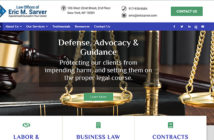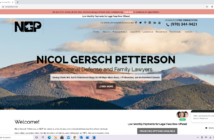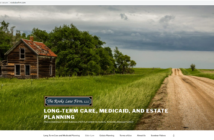A Native American lawyer and an entertainment attorney explain how they approach podcasting and how it is working for their firms.
In terms of online marketing, law firms have come a long way.
Most have email campaigns and newsletters for example, and many are blogging on a regular basis as well. But what if you wanted to go beyond that?
What if you wanted to expand your reach and connect with a broader base of prospects and clients? And what if you wanted to do it without bogging down your marketing department with complex campaigns?
Two law firms have managed to do exactly that by resurrecting a tool that many marketers thought was dead and gone.
They did it with podcasting.
What is Podcasting?
The word “podcasting” is a portmanteau of “iPod” and “broadcasting.” It is digital content accessed via download through web syndication or via online streaming. The most common form of podcasts were historically audio episodes of an ongoing series such as a radio show, However, podcasting has also been used to distribute other types of content, including single-product coaching and educational programs as well video webinars.
Podcasts are recorded using a variety of means, from high-end recording equipment to laptop webcams to free audio recording software such as Audacity. Podcasts can even be recorded using a smart phone and a free recording app such as iPadio.
Case Study #1: Foster Pepper
Foster Pepper is a general practice firm founded in 1904 in Seattle, Washington. Providing services in everything from bankruptcy to real estate, Foster Pepper has secured its position as one of the largest and most established business law firms in the Pacific Northwest.
But it’s in the area of Native American Law that this firm has really distinguished itself from the competition.
As the Chair of Foster Pepper’s Native American Legal Services Group, Greg Guedel has extensive experience connecting with a very targeted audience and providing them with the unique educational tools and resources they needed using the latest technology.
Foster Pepper regularly hosts an annual all-day seminar, devoted specifically to issues and concerns of the Native American community. Greg also acts as Editor of Foster Pepper’s Native American legal blog, The Native American Legal Update.
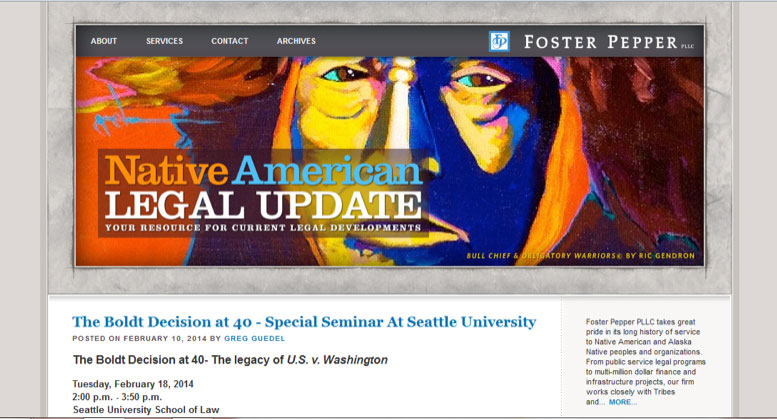
But he wanted to do more, so in 2007 Greg and his team began expanding their content with podcasts.
Today, the Native American Legal Update podcast is considered to be a key resource for advocacy and education of Native American issues.
How They Did It
Because Native American law is essentially a national area of practice – that is, the issues are the same throughout the country – Greg already had plenty of content to work with.
In addition to the annual, all-day seminar, Greg’s Native American Legal Services Group also co-sponsors multiple smaller seminars in cooperation with various groups and organizations. Topics range widely, covering everything from legal issues for native-owned small businesses to relations between Native-Americans and local branches of government. Greg knew this content would be just as invaluable to Native American communities outside their immediate geographic area.
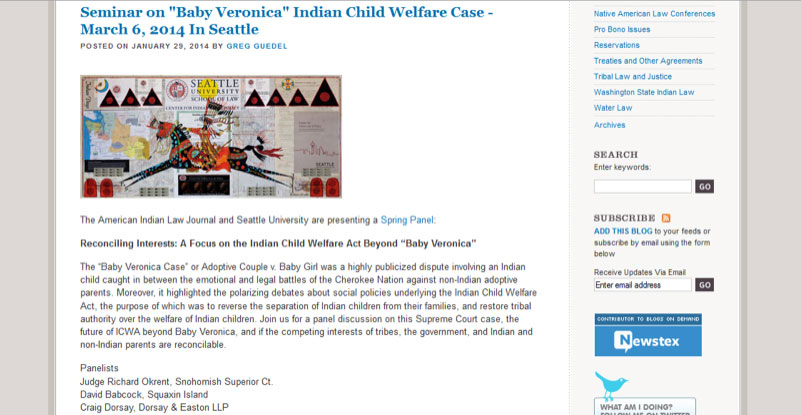
The question was, how could they reach a wider audience?
By recording their seminars – both in audio and video format, Greg’s team now produces several hours of podcasts that are then distributed throughout the year. The annual seminar is shot live with approximately 30-40 attendees in the room, and generates at least 8 hours of podcasts, averaging 45 to 90 minutes each. These podcasts are then distributed on their blog and various social media websites.
The smaller, independent seminars typically run a few hours and are often linked to the hosting organization’s website.
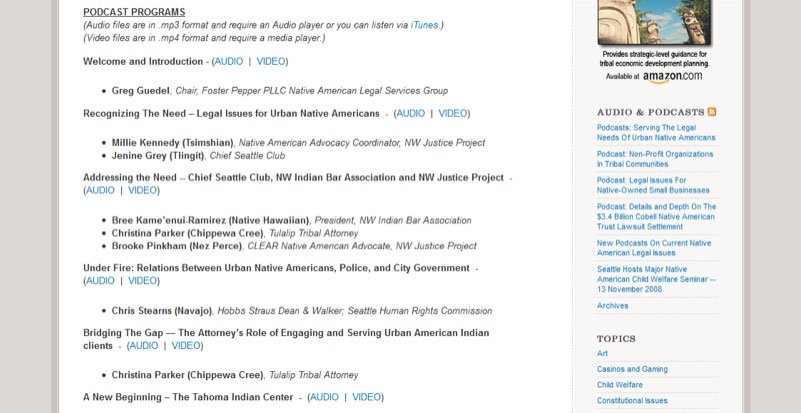
Have their efforts had an impact?
Greg says most definitely yes. “We’ve seen regular growth in our marketing list,” he says, “as well as blog readers and Twitter followers. We’ve also seen an increase in feedback and questions from people around the country, so we know we’re reaching them.”
Aside from the blog and social media venues, Greg also markets the podcasts with various tribal groups, through email marketing and on iTunes, but most of the marketing is word-of-mouth. “We usually see an increase in calls 4 to 6 weeks after we post a podcast,” he said. “That’s about how long it takes to get out there and be seen.”
Greg said podcasting has proved to be instrumental in their growth and success, an invaluable tool for “trying to reach an audience beyond immediate physical space.”
Case Study #2: ARC Law Group
ARC Law Group is a boutique California law firm focused on the Business, Entertainment, Sports and Technology industries.
This niche-mentality and their devotion to customer service have helped make ARC Law Group a respected leader in this competitive area of practice, with such notable clients as Disney, HBO and LucasFilm. Their openness and innovative approach to emerging technology ensures they’ll continue to enjoy that spotlight.
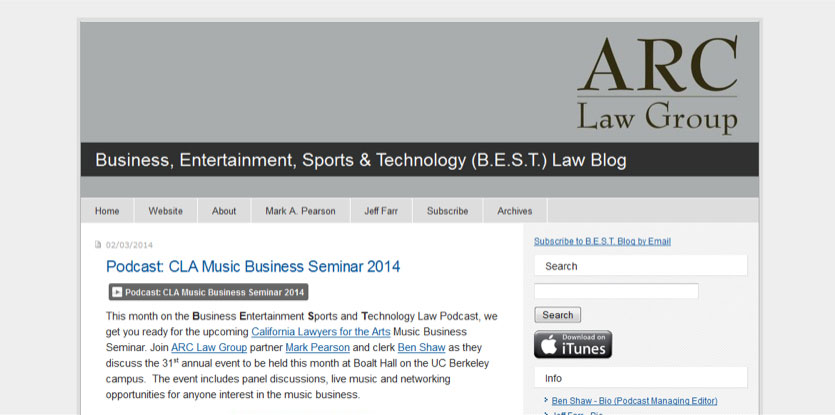
ARC launched their podcast initiative about two years ago, producing a relatively short production hosted by one of their interns. But after receiving positive feedback and requests for more, founder Mark Pearson decided to take over the project and expand their format.
Today, ARC’s podcasts continue to be a popular feature among clients, and a powerful marketing tool for the firm.
How They Did It
Before he began practicing law, Mark Pearson spent ten years as a television reporter, so podcasting was a natural way to utilize that experience in his law firm. His broadcasting background gave him the knowledge he needed to expand the platform and create interesting, engaging segments that would keep his audience entertained and informed.
He employed the help of Ben, a recording engineer turned law student, and together the two of them put together a reliable but inexpensive recording outfit. They commandeered an older laptop from the firm and upgraded microphones and other accessories for around $500.
Mark expanded the show’s original, audio-only interview format and added a legal discussion to it, addressing specific legal topics or current events that were relevant to his audience.
“We try to break it down into two segments,” Mark said. “We’ll talk to a client or someone we’re working with… someone who’s doing something interesting or creative. Often times, that’s a musician or someone who’s started a cool tech company, and then the second half of the podcast is usually a discussion of a legal topic that might be tangentially connected. So, let’s say we interview a musician, we might make the legal discussion about music copyright.
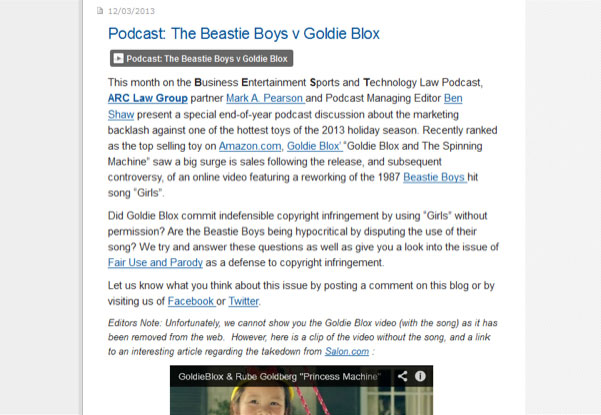
“Sometimes, we’ll also do the legal discussion on something current in the industry. For instance, we did a podcast about the copyright controversy between Robin Thicke’s Blurred Lines and Marvin Gaye’s Got to Give It Up and whether or not the two songs are the same.”
This format has produced monthly podcasts averaging 45-60 minutes, which are then loaded onto the ARC website.
Mark also takes advantage of iTunes and promotes the podcasts in their monthly newsletter and in email footers as well.
What kind of return are they seeing for their efforts?
While Mark admits they haven’t done any formal tracking of ROI, he said the response has been overwhelmingly positive and the podcasts have proven to be an essential marketing tool.
“While it’s hard to quantify the impact the podcasts have had, we do receive a large amount of feedback. I know that our podcasts have been used to introduce potential clients to our firm and to help explain specific legal topics to our clients… and the feedback has been great.”
Looking Forward
Is podcasting right for your firm?
That all depends. There are certainly benefits to podcasting… it’s cost-effective for one, making it a viable solution for even the smallest of firms, and when combined with other marketing strategies, it can help you reach a wider audience in a more personal and authentic way.
And that, according to Greg Guedel, is the real secret to continued growth. “We have a changing business model,” he said. “The old ways of attorneys who billed by the hour and didn’t need to advertise are going away. Now we have new constraints – economic, time, convenience – and we have to find new ways to connect with people and create more opportunities.”
The key to creating good podcasts is in the content and how vested you are in the topic. “Make sure that the people working on the podcast are interested in it and like it,” advised Mark. “The really good podcasts that I’ve heard, you can tell that the people doing it like doing it, in and above whatever marketing benefits they get from it.”
If you’re not sure about where to start, consider reaching out to other groups and organizations that have an interest in your particular topic. In addition to their all-day seminar, Greg Guedel also produces smaller podcasts in cooperation with various tribal groups and organizations. “In December,” he said, “we did a two-hour presentation and the video feed was arranged by a for-profit educational service. They produced the video, sent us the link and we added it to the Native American Legal Update.”
But before you jump into podcasting, you’ll want to consider the full picture. There are some ethical concerns, as Mark Pearson points out, and you’ll want make sure your firm stays in compliance.
“We did a lot of research,” he said. “I actually do a guest lecture on Small Business Issues with Ethics at the University of San Francisco Law School and I’ve had students ask me for ideas for the position paper they have to write for the class. One semester, I suggested a student write a paper on the legal and ethical considerations of doing podcasts, and she wrote a beautiful paper that we now have posted on our blog.”
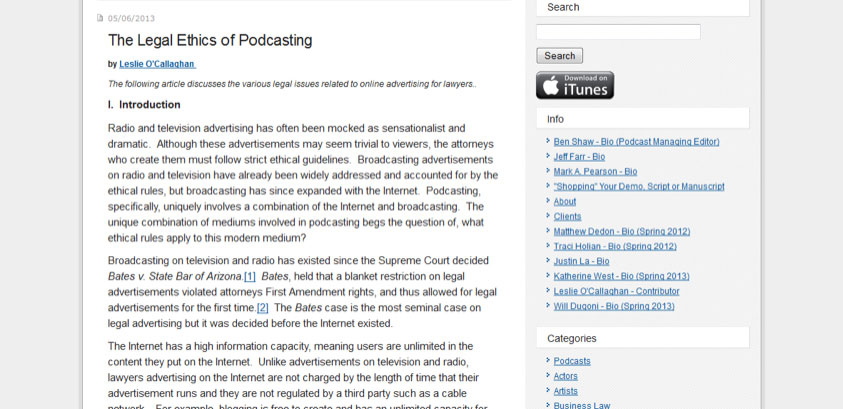
You must have a disclaimer and of course comply with your local bar rules. “So, for instance, here we have to make sure that we announce the name of the firm and where we’re located on the podcast. Then at the end we have a disclaimer that says if you have a legal issue, you should consult an attorney and not rely specifically on the content of the podcast.”
With the right approach and attention to compliance, podcasting can become a powerful tool in your online marketing arsenal. Visit the ABA’s website for more ideas on how to use podcasts in your law firm.

